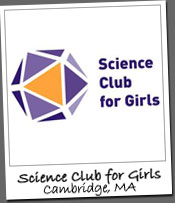In Cambridge, Massachusetts "girl power" means "STEM power." What started ten years ago as a response to troubling research suggesting that middle school girls were losing interest in STEM is now an award-winning program leading the way in readying today's female students to take on the global job market of tomorrow. The Science Club for Girls, which works with about 1,000 youth every year across ten different sites, seeks to increase science literacy and self-confidence in girls, especially those underrepresented in STEM fields, by providing a continuum of engagement from kindergarten all the way through 12th grade. The clubs are semester-long programs focused on hands-on learning in a wide range of STEM topics from astronomy and astronautics to climate change and oceanography. Participants in the Science Club for Girls had more positive attitudes toward science, were more confident in themselves as science students and more aware of STEM careers compared to their peers who did not participate. In fact, an internal evaluation showed that 46% of participating girls want to pursue a STEM career when they grow up, compared to just 35% of their non-participating peers. Over the past seven years, half of the program's high school graduates have chosen a STEM-related college major. As the girls reach middle school, they are exposed to the real-world applications of the principles they study by exploring the wide array of possible STEM-related careers. They are visited monthly by women in science and field trips to STEM companies, universities and other institutions they may not associate with STEM like art conservation, patent law and culinary art. The Science Club for Girls provides youth with successful mentors and role models in the form of women in academic and professional STEM fields who run the clubs. In addition, middle school girls take part in a related program called C.E.L.L.S. (Career Exploration, Leadership and Life Skills), which uses a near-peer mentoring model that allows participants to act as Junior Mentors for younger girls and help facilitate club activities. This helps to retain those younger girls as they look forward to working in a new role while maximizing their self-image. In a survey, over 95% of C.E.L.L.S. participants who were previously uninterested in science said that they became much more engaged, especially in the topics they were helping to teach. One 8th grader who participated in both the Science Club for Girls and C.E.L.L.S. put it best: "I never thought of myself as a junior mentor for younger girls. I didn't think I had the brains to become a scientist... People gossip that [it's] a boy's job or about how only nerds and geeks can be scientists. Over the last semesters, I learned it doesn't matter what your race, age, or appearance is. You can do anything and become anything you put your mind to... It's about having friends and peers to encourage you through your goal, which is the relationship I had with my team in SCFG. Science Club for Girls made me realize that I have the power and the knowledge to become a scientist." Together, the Science Club for Girls and C.E.L.L.S. provide much-needed professional, emotional, and relational development for the girls involved by focusing on building strong bonds amongst the youth and coaching them to seek out and identify mentors all while teaching them to appreciate the diversity among the Club participants. "The girls come from different communities and backgrounds... are US-born and immigrant; native to Massachusetts or other states;...homeless, live in housing developments or affluent neighborhoods; from two-parent or single-parent families; and have traveled the world by choice or by circumstance," said Executive Director Connie Chow. "Our goal is to have girls develop respect for each other and find commonalities with each other." | 







